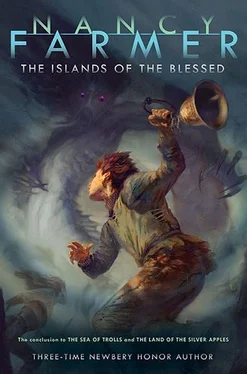“Look what the storm has washed up,” said the Bard. “Fetch us some of that stew while I put our friend to bed.” He urged the bird to an alcove filled with straw. Jack noticed that it hopped unsteadily and that one of its wings dragged on the floor.
“What is it?” he asked.
“A great wonder,” said the Bard enthusiastically. “He’s called a—what did you say, Thorgil?”
“An albatross,” she replied sullenly. She was pale and her face was badly bruised, but she seemed to have recovered.
“He’s a visitor from the far south, and I do mean far,” said the old man. “Imagine! There’s a place even I haven’t heard of. It’s a land full of ice mountains that groan all winter long and break off into islands when summer comes.”
“It sounds like Jotunheim,” said Jack.
“I thought so at first, but Seafarer—that’s the bird’s name—says it’s home only to birds and seals. It’s so remote, I can’t understand his speech. Fortunately, Thorgil can.”
Jack took down a stack of bowls, placed a chunk of bread in each, and ladled stew over it.
“The poor fellow took a beating in the storm. Dislocated his wing. Thorgil found him struggling in the surf and carried him here.” The Bard was delighted with his new guest, and Jack knew it was due to tales of a new land beyond the sky’s reach. The Bard was always interested in new things.
Jack and Thorgil sat on the floor to eat. “I’ve never seen such a big seagull,” the boy said, watching the bird fidget in his alcove.
“I haven’t seen anything like him either,” the old man said. “He wasn’t at all friendly when he arrived—tried to peck out my eyes—but I soon put him straight with a fear-spell. We have an uneasy truce now. He needs my help, and I’ll only give it if he behaves.”
“I’d like to learn a fear-spell,” said Thorgil, spearing a morsel of stew meat with her knife.
“I wouldn’t dream of teaching it to you,” the Bard said. “You’d terrorize the village every time you got into a snit.”
The albatross clacked his beak. Jack held out a chunk of meat at arm’s length, and the bird seized it before retreating back into the shadows.
“He trusts you,” the old man said approvingly. “That’s very interesting. Your powers have grown since you lost your staff.”
Jack concentrated on his food. It still upset him to think about the staff. He’d cut it from a branch of Yggdrassil. It had been a true bard’s staff, except that he’d had no time to learn its powers. He’d lain it across the barrier between life and Unlife to lift a curse from Din Guardi. Now it was gone, ashes on the wind.
“That deed opened a door into the unseen world for you,” the Bard said, correctly guessing what was on Jack’s mind. “Sacrifice, done rightly, is stronger than magic.”
“Northmen sacrifice thralls,” Thorgil said. “I never saw it do them any good.”
“I’m not talking about the slaughter of hapless slaves. I’m speaking of a man who lays down his life so that others may live, or a woman who starves herself to keep food in her children’s mouths.”
“You sound like one of those mewling Christians,” sneered the shield maiden. Jack raised his hand to caution silence. The Bard was slow to anger, but you didn’t want to push him too far.
“I wouldn’t dismiss Christians so readily, Thorgil Small-Brain,” the old man said. “They may seem weak, and some of them are certainly rogues, but they have prevailed in situations that would slow the blood of the bravest hero.”
“They’re only fit to pull dung carts,” Thorgil said carelessly. “The future belongs to the strong.”
“That belief is why Northmen are going to disappear.”
“Disappear!” Thorgil sprang to her feet. “My people will never be defeated! Our fame will never die!”
For an instant the hearth flames blazed and the shadow behind the Bard loomed. Thorgil sank to the floor, her eyes wide and frightened. The albatross moaned, and Jack was suddenly clammy with sweat. Then the flames subsided. The Bard was a kindly old man again, normal-size and a bit frail.
“Good fear-spell,” murmured Jack.
“Thank you,” said the old man. “I learned that one from a sea hag in the Orkney Islands.”
The shield maiden struggled to a sitting position with as much grace as she could manage. Her eyes shot daggers at the Bard.
He continued, ignoring her. “Many strange things have been happening: the Wild Hunt, the loss of Gog and Magog, the arrival of Seafarer, that cry from the sea.”
“You heard it too, sir?” Jack said.
“I could hardly miss it. I was on the cliff watching waves,” the Bard said. “I was rather hoping to find another albatross. The cry came from directly below, and I was about to climb down to investigate when I saw a creature poke its head out of the water. It was as long as a Northman ship with a huge tail curled beneath it.”
“A sea serpent?” cried Jack.
“A much rarer being. It was a Pictish beast.”
“Now I know we’re in for bad luck,” Jack said.
“For shame,” the old man scolded. “Not everything Pictish is bad. At any rate, this beast seemed drawn to whatever screamed. It made straight for shore, and I ran for my staff. You can never be quite sure whether a monster is hungry or merely curious. It was gone by the time I returned.”
“And the creature below?”
“I couldn’t find it,” said the Bard. “You know, I’ve heard that cry before, but I can’t quite remember where.”
“We should hunt for it,” said Thorgil. She drew her knife and held it up in the firelight. Her movements were much more polished after a year practicing with her left hand, but she would never regain her earlier skill. Her right hand looked completely normal, apart from a strange silvery hue, but it was as useless as a block of wood.
Jack wasn’t sure whether Thorgil’s paralysis was of the mind or whether some dire ill had passed to her from the demon she had attacked. The Bard had tried to heal her. Even Brother Aiden (when she was asleep and couldn’t spit at him) had prayed over her. Nothing helped.
“It’s as black as a lead mine out there,” the Bard said. “It’s far more likely something would find you before you stumbled over it. Besides, I have new magic for you to learn, Jack.”
The boy was elated. At last! Months had passed with only a repetition of the spells he’d already studied. He’d called up fire, calmed winds, and practiced farseeing, which had shown him meaningless beaches and gloomy rocks. The only new spell he’d learned was to separate grain from grit by calling to the life force within the kernels.
“What about me? Why can’t I learn magic?” demanded Thorgil.
“I haven’t chosen you as my apprentice, but if it’s any consolation, you already have some powers. When you tasted dragon’s blood, you became part dragon. That’s why you can understand the languages of the air.”
“Part dragon?” Thorgil said, interested. Jack could almost see the thought passing through her mind. If she were part dragon, she could fly over her enemies and blast them with fire.
The Bard smiled grimly, showing that he, too, understood. “Don’t expect to sprout wings anytime soon. You’ve been given a useful skill, and through the sacrifice of your hand, I suspect you’ve gained even more. You might even turn into a healer.”
Jack hooted with laughter before he could stop himself.
“Your wits have turned,” Thorgil snarled. “I am no healer to mumble charms over weaklings. I’m a shield maiden and will fall in battle holding my sword, even if it’s in the wrong hand.”
“That path is no longer open to you,” the Bard said. “I’ve seen how the horses come to you and follow your every command. I heard how you lifted that crow from the mud and breathed hope into his wings.”
Читать дальше










